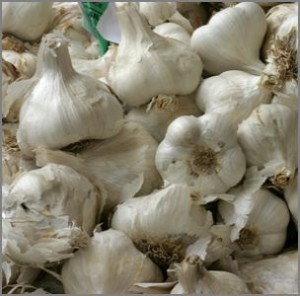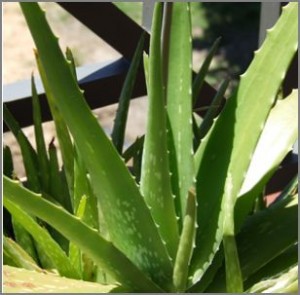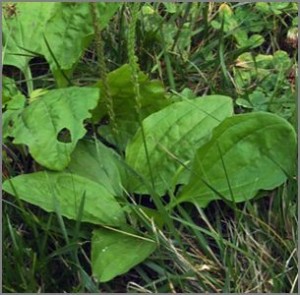Guest post by Kristen at Simply Kristen where she writes on herbs, homesteading and natural living.
Have you ever started researching something new, bought a bunch of supplies just sure it would work out just right, then be disappointed and feel like you spent money carelessly? Well, if you haven’t – I know I have a few too many times! Herbs, just like any hobby or new research area, can be a waste of money in the beginning if you don’t know what you’re doing. That’s why I’m going to share three Herbal Healers that cost next to nothing and you’ll find easy success with- I know I have!
Two of the three Herbal Healers can be found at most large grocery stores, and one right in your yard! They are: Aloe Vera, Plantain, and Garlic.
Aloe Vera
My grandmother always had a few aloe plants around the property and whenever I got bit by a fire ant we’d quickly cut off a piece of aloe, open it up and rub the juices on my bites. Almost instantly the itching was better and I knew the healing process was started. That’s because aloe contains a pain relieving agent and is a contact healer! Aloe vera is also used for burns, sores, circulation improvement, and expulsion of pinworms! Gross- but it’s true. Many people drink Aloe vera juice (you can find it at your Health food store), because it is anti-parasitic, promotes internal healing, and sometimes used in the treatment of diabetes and other auto-immune disorders. Aloe vera is truly one of the great healers. Go try it for yourself- it’s so easy!
Plantain
Unless you live in Antarctica, you have plantain growing close to you. Plantago lanceolata is one of the most common weeds that people complain about- Oh! If they only knew the healing powers of this little plant. Plantain is THE first rate “First Aid” plant that is thankfully close at hand. A few fresh leaves chewed or crushed can be immediately applied to any wound to help stop bleeding, reduce the pain, remove the inflammation of stings, and relieve itching from rashes or bites. Plantain is one of my three year olds favorite things to find. A few times she has been bit by a bug and we immediately found some plantain. I chewed it up (just like any good Mom) and slapped in on her bite. A few seconds later she’ll tell me “Momma! It doesn’t hurt anymore!” Just make sure the plantain you are chewing or using hasn’t been visited by the dogs or the herbicide sprayers first ![]()
Click here to watch a video of me making a Poison Ivy Rash Remedy using plantain and aloe vera gel.
Note: There are a lot of weeds that can look like plantain. Study some close-up images before you start using it.
Lindsay’s note: Plantain is also a great herb to help with diaper rashes. Read more here.
Garlic
You know the smelly root, but did you know it’s also nature’s antibiotic? Currently, it’s being studied because scientists have found it’s one of the only things that kills the dreaded Staph infections.
Properties: Antibacterial, antiviral, antiseptic, antiparasitic, antifungal, anthelmintic, immune-stimulating, hypotensive, diaphoretic, and antispasmodic. Whoa!
It’s Active against: Tuberculosis, Shigella dysenteriae, Staphylococcus aureus, Pseudomonas aeruginosa, Candida albicans, Escherichia coli, Streptococcus, Salmonella, Proteus mirabilis, influenza, and many many more.
Uses: We use garlic anytime we start feeling run down….. you know how the beginning of a cold or virus feels!
Eating it: I’ll chop up a clove into tiny pieces and just swallow it like a large vitamin. However, everyone else in the house prefers it on a spoonful of honey followed up by a swig of water. Come to think of it- I bet it decreases disease transmission simultaneous because people don’t want to get too close to the stinky family- HAHA!
Poultices: Just like everything else, garlic soaks into your skin and gets into your bloodstream. To make a poultice, break off two or three large cloves and lay them on your counter. Get some hot water together, and place the cloves on a clean cloth. Smack the garlic cloves with the bottom of a heavy glass a few times till you can see the juices coming out. Now fold the cloth over and pour warm/hot (but not boiling) water over it. Let it sit for a few seconds then squeeze out the excess water. Place the warm (not hot) poultice on the chest, the back, and the soles of the feet (rotate) for about a minute each. You can do this several times a day. This also works well for babies who won’t swallow fresh garlic.
Garlic Oil for earaches: Slightly warm a few tablespoons of olive oil with crushed (fresh) garlic in it. Let it sit a few minutes then thoroughly strain out all of the garlic. Now use as standard ear drops (make sure it is not hot!). You can also use a garlic poultice over or behind the ear for suspected mild infections.
Warning: it can burn the skin, don’t leave directly on skin for more than a minute or two.
Important note: To utilize all the medicinal qualities of garlic it must be used within 15 minutes of the clove being crushed. chopped, or bruised. After that, the Allicin loses 90% or so of its effectiveness…. So sorry, you’ve got to remake that garlic oil and poultice each time. ![]()
That’s the Three Easy Herb lesson for the day! I don’t know all the answers, but I can find the people that do! You can follow my videos, audio podcasts, and herbal, homesteading, and natural health adventures at my site – Simply Kristen. Hope to see you there!-Kristen ![]()


Do you have anemia? My mom had that and she took nettle tea, vit B, vit C, chlorophyl, yellowdock capsules, and Energizing Iron (previously called ‘liquid liver’. She also ate a lot of beef. Then she finally got better! She also took licorice tea for her adrenal system, because she had been anemic for quite some time, and had probably been running on adrenaline. Hope this helps!
This is a wonderful blog post! I will have to check out Kristen’s blog. I am trying to learn about herbal remedies this year.
RE: garlic – my stepdad swears by garlic (and lots of it) to keep away the “state bird” of Minnesota, where he’s from…. the mosquito! I always blew him off when I was a teenager, but as I got older I noticed that everyone at BBQs was eaten up by the bugs but him!
Hi Everyone!
I’m so glad you enjoyed the post…. I enjoyed writing it for Passionate Homemaking (what an awesome resource BTW!)
Yes, Dandelion and Stinging Nettle are very common too! I also wrote about 3 herbs (weeds!) I quickly found in my yard a couple weeks ago here http://simplykristen.com/?p=41.
About Plantain-
Here is a better description for Plantain: It varies greatly in size depending on soil conditions and how often you cut the grass.
Buckhorn plantain leaves are dark green, long and thin, seldom more than an inch or so wide. http://www.uky.edu/Ag/ukturf/weed%20id/buckhorn-plantain2.jpg
Broadleaf Plantain leaves are much wider and have eight veins running through it (no center vein) http://njaes.rutgers.edu/weeds/weed.asp?broadleafplantain
Great Info!! Just a thought… lots of the aloe vera that you buy in the store can be very watered down because the companies don’t have to report the water content. Do research to find brands that use it pure or tells you how much water is in their product.
As a long-time diabetic myself, I was able to achieve measurable results by following the advice given at http://www.MedicalAloe.com by Dr. Ivan E. Danhof, the leading expert on Aloe Vera and natural herbal remedies. I strongly recommend reading the facts in the presented research materials.
That’s a great lesson, Kristen! I’m pretty sure I just weeded out some plantain from my garden this morning. It’s one herb that I haven’t used much, so I appreciate learning a little more about it!
It’s one herb that I haven’t used much, so I appreciate learning a little more about it!
i love garlic! Thanks for sharing this useful info!
For my own earaches, I’ve found that chopping and smashing a bit of onion, warming it on the stove in a metal measuring cup with a little water, and then using the strained, warmed water in my ear works well. It isn’t as clogging feeling as using oil and it isn’t as stinky as using garlic, and I usually have onions handy.
Wow! Thank you so much! We eat tons of garlic…we may smell but in generaly my husband and I are pretty healthy. Too bad my infant son can’t eat it…
It’s awesome to eat a lot of garlic, it helps with heart health too. .
.
For your son, try a garlic poultice if he ever gets a little sick
Great post! I have enjoyed “Simply Kristen” and was so glad to see you had her as a guest post here!
What a great post! I’ve added Kristen’s blog to my reader. Thanks for the introduction!
Lindsay, thanks for this post via Kristen. When it mentioned plantain, of course my first thought went to the banana’s cousin, not a weed! LOL. Thanks for the clarification on that…prevented some embarrassment I’m sure.
P.S.- I gave you a “Kreativ Blogger” award, you can hop on over to my site to grab it. Hope you and the fam are doing well!
Hope you and the fam are doing well!
Great info thanks so much for this post!!!
I had no idea about Plantain. I hope it’s one of the weeds I find when I’m cleaning out the flower bed!
Great post!
Dandelion and stinging nettle would be another two very common weeds with medicinal uses….
what a wonderful timing. I was just wondering yesterday what the word for plantain was in English, since I only knew its’ Russian equivalent. I remember often actively playing outside with my friends and whenever one of us got a cut or a scrape, we’d find a few leaves of plantain, crush them and apply to the wound. We wouldn’t even run home to get help, because hey, why miss out on fun time with friends when they can take care of your wounds